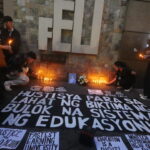These effects of reclamation projects to the communities are what Jonila and Jhed were looking into in Bataan. But because of their abduction, not only was their research cut short, the results of their investigations disappeared after their equipment and gadgets were confiscated by the military.
By ANNE MARXZE D. UMIL
Bulatlat.com
MANILA – It was only a few months when two young activists Jonila Castro and Jhed Tamano had just started their work in the communities of Bataan when they were abducted by the state forces on the rainy evening of Sept. 2.
Young environmental activists Jonila Castro and Jhed Tamano were organizing communities in Bataan and investigating the effects of the government-endorsed reclamation project of Manila Bay.
Jhed had just earned her Business Administration degree at the Bulacan State University (BSU) when she learned about Akap Ka Manila Bay’s call for volunteers to work in the coastal communities of Bataan.
“I was thinking of going on full time after graduation, then I heard the call for volunteers and immediately I was connected with Akap Ka Manila Bay. Since then I decided to work full time in the community, it was in June,” Jhed, the shy girl among the two, said in an interview with Bulatlat.
Meanwhile, Jonila said it was in July that she also started working in the communities of Bataan.
“The issue of reclamation was already getting attention at that time. But there is nothing about the effects of reclamation in Bataan,” she said.
There, she said they did not only do their research on the effects of reclamation in the livelihood of the people in the communities but also facilitated village consultations, an education drive on the issue as well as organized the communities.
Then the abduction happened.
State forces claimed that they were members of the revolutionary group New People’s Army (NPA) but the two refuted this in a Sept. 19 press conference organized by the National Task Force to End Local Communist Armed Conflict (NTF-ELCAC). In retaliation, state forces filed perjury charges against the two. The Armed Forces of the Philippines alleged that the two are being used by the NPA to “embarrass the government.”
Projects in Bataan
According to Akap Ka Manila Bay (Alyansa ng mga Mamamayan Para sa Pagtatanggol ng Kabuhayan, Paninirahan at Kalikasan ng Manila Bay or Citizens Alliance for the Defense of Jobs, Homes, and the Environment of Manila Bay) there are numerous planned projects in the province of Bataan. This includes the coastal sea barrier which also functions as an expressway connecting Bataan and Metro Manila, the Bataan-Manila Integrated Transportation System, Bataan-Cavite Interlink Bridge Project, the Bypass Road Project in Limay, the Bataan New Container Port City in Pilar, an expansion program of the Freeport Area of Bataan and the Mariveles Bay Reclamation and Future Transshipment Hub.
The group said there are evictions of residents in Capunitan, Orion, Bataan. Residents of four villages in Mariveles were also evicted to make way for the planned Future Transshipment Hub.
These projects are part of the government’s National Reclamation Plan, which is set to implement 102 reclamation projects covering 38,000 hectares of foreshore areas. Thirty-eight of the said projects encompass 26,234 hectares or 70 percent of the target scope of reclamation will be implemented in Manila Bay.
These will cover several coastal towns of Cavite province (Cavite City, Tanza, Noveleta, Rosario, Kawit and Bacoor City), coastal cities of Metro Manila, and coastal towns of Bulacan, Pampanga and Bataan in the Central Luzon region.
Read: Fishers, experts call for 10-year moratorium on reclamation
Read: Aquino’s planned privatization of 38,000 foreshore lands for reclamation slammed
Jonila said when they get to talk with the people in the communities, many of them are complaining about their low catch in the sea.
“They said they only get one or two kilos in their fishing. When we asked when the last time that they had a good catch, they said it was in December last year. We also asked what causes it, they also did not have a definite answer that’s why we are also looking into it. But some of them also suspect that it was caused by the oil refinery in Limay, Bataan,” Jonila said.
In Limay, Jonila said reclamation is already taking place, covering four to six villages as well as in Pilar. Fisherfolks in communities of Orion were also evicted, she said.
In 2020, clearing has also started in three seaside villages in Pilar where the Bataan New Container Port City is planned to be built, according to a report by state-owned Philippine News Agency. To be built in the said Pilar economic zone are a golf course, amusement and theme park, hotel and restaurant among others.
“If these reclamation projects push through, Bataan will be flooded just like what is happening in Plaridel in Bulacan,” Jonila said.
Read: ‘We will go hungry, die from worse flooding’ if SMC buries part of Manila Bay for land projects – fisherfolk
Read: ‘SMC airport project to worsen flooding, displace families in Bulacan’
Read: Conflict of interest’ seen in SMC P1-B Manila Bay rehab partnership
Jonila also added that people in the communities knew that once the reclamation project pushes through they would be losing not only their livelihood but also their homes where they have been living for many years.
These effects to the communities are what Jonila and Jhed were looking into in Bataan. But because of their abduction, not only was their research cut short, the results of their investigations disappeared after their equipment and gadgets were confiscated by the military.
What took place during their captivity
On Nov. 7, Jonila and Jhed filed their counter-affidavits categorically denying the charges against them. They described the complaint as “baseless, malicious, contrary to human experience, and having been spoken from a position that is much detached from reality.”
“The facts alleged in the complaint do not operate in a vacuum as deceitfully presented in the complaint. Crucial to the supposed facts are the antecedent events beginning Sept. 2 which were conveniently omitted in the complaint, thrown under the rug, and purportedly subsumed in the simplification made in the statement, ‘our battalion received information that the two members of the communist terrorist group were in Pampanga,’” the two said in their affidavit.
In their counter-affidavit, the two narrated how their abductors interrogated them while being blindfolded. They were asked details such as addresses, organizations, among others. The abductors also asked about their affiliations, organizational structures, members, leaders and officers.
They were also threatened with words like, “pagtatabihin naming kayo sa isang hukay (we will put you together in one grave),” “puputulin namin ang dila mo (Jhed) kapag hindi pa rin kayo nagsalita (We will cut your tongue Jhed if you would still refuse to talk),” “ano ang mas pipiliin ninyo, ang pamilya ninyo o ang kilusan (which would you choose, your family or the movement)?”, “ikukulong naming kayo sa kasong rebellion (we will put you to jail with a case of rebellion),” and “hindi ako takot mamatay dahil hindi rin ako takot pumatay (I am not afraid to die because I am also not afraid to kill).”
The interrogations continued in the following days. Due to the series of questioning and the psychological torment caused by the long interrogation and threats, Jonila broke down.
“Jonila just went along with the questions, but requested to see Jhed first to which the captors obliged. We were also both led to believe that the other had already spoken, to make us submit to our captors’ orders,” the affidavit read. This is when Jonila remembers having seen the words, “70th Infantry Battalion, Matatag at Matapat” written at the bottom part of an open page on one of the laptops used by one of the abductors.
They were also asked to write a statement, the contents of which were dictated by their captors, to say that they were surrenderers.
“Said statements, which were handwritten by us, contained stories supplied by our captors which they asked us to revise several times. We were dictated to keep writing until our captors were satisfied with the crafted narrative,” the two said in the counter-affidavit.
A member of the NTF-ELCAC communications teams also convinced them to do a press conference “to silence the groups” who were looking for them. The two refused the offer. Days have passed and two have assessed how to tell the public the truth, and so they agreed to do a press conference on Sept. 19.
“Jonila and I agreed that our best bet to liberate ourselves was to do the press conference which will allow us to speak directly to the public, without the risk of anyone interfering with the truth,” they said in the affidavit.
The two added that they had to tell the truth during the press conference because they “do not want to be complicit in the pretense that the groups looking for us were lying about our abduction. It was the military’s account that these groups were lying; we didn’t want to be complicit in that machination,” they added.
Living with the masses
Contrary to the allegations of the state forces that the two were members of the NPA and paint them as “terrorists,” the two were actually living a simple life in a community in Bataan to further the campaign to stop the development projects, which they said are detrimental to the people as well as to the environment.
Jonila said that not only are there reclamation projects in some towns in Bataan, there is also black sand mining. Mountains are being destroyed because this is where the developers get the soil to reclaim some parts of the sea.
In just a few months of their work, Jonila and Jhed were able to establish a good relationship with the community.
“We were treated like their own children. There were times when there was a good catch, we would eat seafood. The masses would go, ‘sorry this is all we have’ but it’s seafood!” Jonila said, adding that seafood is expensive in some other places.
Some were also comfortable in telling their life stories. “They would tell us their challenges and how they faced it. That is some of the lessons I learned from them, being strong despite the challenges in their lives,” Jonila said.
Jhed also said that the fishermen would tag them along in the sea to catch fish or teach them how to cook. They also learned how to swim.
The residents were also caring, Jonila said, adding that when Jhed became unconscious, they took care of her.
Most of all, Jonila said that they appreciated the work they do for the community. “They would tell us that they are pleased to know that there are people like us, even if we are younger, who took the time to look into their situation, let them know their rights and fight alongside them even though we don’t live in their community,” Jonila said.
For Jonila and Jhed, their advocacy will not only benefit the people in the communities of Bataan but the future generation.
“I’d like to look at it as something that the future generations will never experience – that they have to choose between staying with their families or being away from them to help the marginalized. I hope that one day no youth will have to make that decision because I do believe that one day there will be no more injustices,” Jonila said. (RTS, RVO) ![]()





